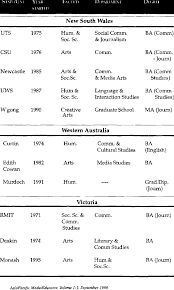Exploring the Impact of Journalism Courses on Media Proficiency in the UK

The Importance of Journalism Courses in Today’s Media Landscape
Journalism plays a crucial role in society by providing information, holding power to account, and shaping public discourse. As the media landscape evolves with technological advancements and changing audience preferences, the need for well-trained journalists has never been greater.
Journalism courses offer aspiring journalists the opportunity to develop essential skills and knowledge needed to succeed in the fast-paced world of media. These courses cover a wide range of topics, including news writing, investigative reporting, ethics in journalism, multimedia storytelling, and digital media production.
One key benefit of journalism courses is that they provide hands-on experience through practical assignments, internships, and collaborations with media outlets. Students learn how to research and verify information, conduct interviews, write compelling stories, edit audiovisual content, and engage with diverse audiences.
Moreover, journalism courses emphasise critical thinking, ethical decision-making, and understanding the role of journalism in a democratic society. Students are encouraged to question assumptions, challenge authority when necessary, and uphold journalistic standards of accuracy and fairness.
In today’s digital age, journalism courses also focus on new media technologies and platforms. Students learn how to leverage social media, data analytics tools, mobile reporting techniques, and virtual reality storytelling to reach wider audiences and tell impactful stories.
By enrolling in journalism courses, students not only acquire practical skills but also gain a deeper appreciation for the importance of independent journalism in fostering transparency, accountability, and informed public debate. Whether pursuing a career in traditional print media, broadcast journalism or online news platforms, a solid foundation in journalism education is essential for success.
In conclusion, journalism courses play a vital role in preparing the next generation of journalists to navigate the complexities of today’s media landscape. By honing their craft under the guidance of experienced professionals and academics, students can contribute meaningfully to society by informing citizens, uncovering truths, and amplifying diverse voices through responsible storytelling.
Essential FAQs About Pursuing a Journalism Course in the UK
- What qualifications do I need to enrol in a journalism course?
- What topics are covered in a typical journalism course curriculum?
- Are there opportunities for internships or work placements during the journalism course?
- How can a journalism course help me pursue a career in media and communications?
- What are the key differences between print, broadcast, and digital journalism courses?
What qualifications do I need to enrol in a journalism course?
To enrol in a journalism course, the qualifications required may vary depending on the institution and the level of study. Typically, most journalism courses at universities or colleges require applicants to have a minimum educational background of A-levels or equivalent qualifications. Some institutions may also consider relevant work experience, writing samples, or a personal statement demonstrating a keen interest in journalism. Additionally, proficiency in written and spoken English is essential for success in journalism courses. It is advisable to check the specific entry requirements of the journalism course you are interested in to ensure you meet the necessary qualifications for enrolment.
What topics are covered in a typical journalism course curriculum?
A typical journalism course curriculum covers a wide range of topics essential for aspiring journalists to excel in the dynamic field of media. Students can expect to delve into subjects such as news writing, investigative reporting, media law and ethics, multimedia storytelling, digital journalism tools and technologies, photojournalism, broadcast journalism, interviewing techniques, feature writing, editing skills, and the role of journalism in society. By exploring these diverse areas of study, students gain a comprehensive understanding of the principles and practices that underpin quality journalism and develop the necessary skills to thrive in today’s rapidly evolving media landscape.
Are there opportunities for internships or work placements during the journalism course?
Prospective students often inquire about the availability of internships or work placements during journalism courses. Many reputable journalism programmes offer valuable opportunities for students to gain real-world experience through internships or work placements. These practical experiences allow students to apply their classroom learning in professional settings, develop industry-relevant skills, build a network of contacts, and enhance their portfolio. By participating in internships or work placements, students can immerse themselves in the dynamic field of journalism, learn from seasoned professionals, and prepare for a successful career in the media industry.
How can a journalism course help me pursue a career in media and communications?
Enrolling in a journalism course can significantly benefit individuals aspiring to pursue a career in media and communications. These courses provide a comprehensive foundation in essential skills such as news writing, investigative reporting, multimedia storytelling, and digital media production. By gaining hands-on experience through practical assignments and internships, students learn how to research, verify information, engage with diverse audiences, and uphold journalistic standards of accuracy and fairness. Additionally, journalism courses emphasise critical thinking, ethical decision-making, and the role of journalism in a democratic society. With a strong educational background in journalism, individuals are better equipped to navigate the dynamic landscape of media and communications, making them valuable assets in the industry.
What are the key differences between print, broadcast, and digital journalism courses?
When considering journalism courses, it is essential to understand the key differences between print, broadcast, and digital journalism. Print journalism courses typically focus on traditional news writing, investigative reporting, and editing for newspapers and magazines. Broadcast journalism courses emphasise skills such as on-camera reporting, video production, scriptwriting, and broadcast ethics for television and radio platforms. On the other hand, digital journalism courses delve into online news reporting, multimedia storytelling techniques, social media engagement, data journalism, and mobile reporting strategies tailored for digital platforms. Each type of journalism course equips students with specific skills and knowledge relevant to the evolving media landscape in their respective mediums.
